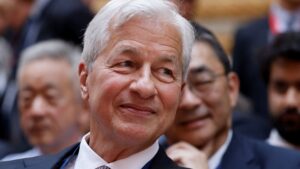Understanding JPMorgan Chase’s Share Buyback Strategy: Insights from the Extreme Investor Network
In the ever-evolving landscape of finance, staying informed about the decisions of major players like JPMorgan Chase is crucial for investors. Recently, CEO Jamie Dimon and his executive team found themselves at the center of a financial discourse during the "Choose France Summit" at the opulent Chateau de Versailles. As they navigate $35 billion in excess capital, investors are eager to understand the bank’s strategic direction in the upcoming economic climate.
The Excess Cash Quandary
JPMorgan Chase has reported record profits, but with great success comes great responsibility, particularly concerning capital management. CFO Jeremy Barnum recently spotlighted a "high-class problem" for the bank: the growing pile of excess capital that exceeds regulatory requirements. Analysts estimate this sum to be an impressive $35 billion, prompting questions from stakeholders about how the bank plans to utilize this surplus effectively.
Barnum expressed a desire to mitigate the excess further, acknowledging that without immediate opportunities for investment, returning capital to shareholders through share buybacks appears to be the plan. However, he was candid about the complexities of the economic landscape, advocating for a strategy that considers potential risks of an impending recession, a topic Dimon has long highlighted.
Dimon’s Cautious Approach to Buybacks
While shareholders are advocating for increased buybacks, Dimon recently articulated his reluctance, especially when stock prices hover near their peak. “We’re not going to buy back a lot of stock at these prices,” he stated, reflecting concerns over valuations that surpass tangible book value. In Dimon’s view, repurchasing shares at inflated prices can be financially detrimental to shareholders in the long run.
This perspective is significant at a time when JPMorgan’s stock has surged by 22% since Dimon’s previous comments. As investors consider the timing and scale of stock repurchases, understanding Dimon’s caution can provide clarity in an unpredictable market.
A Dual Strategy: Buybacks vs. Economic Preparedness
The tension between capital return and preparing for potential economic headwinds illustrates JPMorgan’s position as a bellwether for the financial sector. According to Portales Partners analyst Charles Peabody, JPMorgan is poised to deploy its capital reserves strategically. “The best time to take market share is coming out of a recession," Peabody noted, highlighting the importance of being disciplined with capital allocation.
As Diemon and Barnum weigh the potential benefits of deploying excess cash in a downturn versus the immediate benefits of buybacks, investors must keep an eye on both market shifts and broader economic indicators.
Navigating the Uncertain Waters Ahead
With sentiments of a recession lingering on the horizon, JPMorgan Chase’s strategic decisions will not only affect its shareholders but also the broader market. Investors should consider the implications of a disciplined management approach, which may involve scaling back on buyups in favor of building financial resilience amidst economic uncertainty.
At Extreme Investor Network, we believe that understanding these dynamics allows investors to make informed decisions. We pride ourselves on providing unique insights into the evolving strategies of financial institutions, empowering our readers to navigate the complexities of investing.
Conclusion
As JPMorgan Chase grapples with its capital strategy, investors are reminded of the delicate balance between rewarding shareholders and preparing for an uncertain economic future. The decisions made by Dimon and his team today could shape the landscape of the finance sector for years to come.
Stay updated by subscribing to Extreme Investor Network, where we dissect the latest trends and strategies from top financial institutions, ensuring you remain one step ahead in your investment journey.

